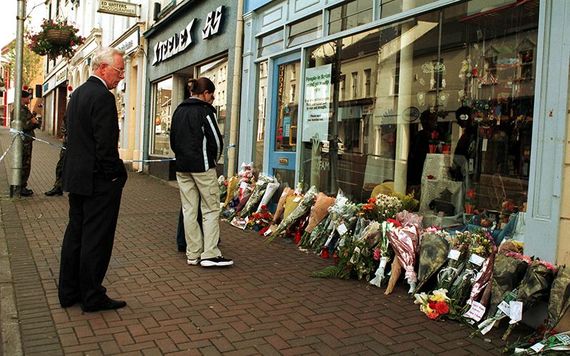A bell will ring slowly 32 times on Wednesday, August 15, 2018 in Omagh where the worst terrorist attack in Northern Ireland's Troubles era happened exactly 20 years ago.
Each peal will record the deaths of the 31 victims, including twins carried by a 30-year-old woman, and the extra ring is in remembrance of all who have and continue to lose their lives through such atrocities the world over.
The bell will stop ringing at exactly 3:10 p.m., the moment the bomb exploded in the crowded town center on a sunny August 15, 1998, just four months after the vital peace-seeking Good Friday Agreement was signed by the Irish and British governments and by most political parties in Northern Ireland.
The 500 pound bomb, hidden in a parked car and which injured 200 people in addition to those killed, was deliberately planted by a republican dissident group called the Real IRA.

Flowers left in rememberance of the 29 murdered by the IRA in Omagh, County Tyrone.
It was intended to attempt to wreck the Good Friday deal and stoke hatred in a town where Protestant and Catholics, unionists and republicans, lived peacefully together.
Read more: Chilling photo at Omagh taken minutes before IRA bomb in 1998 which killed 29
The bombers’ intention to sow dissent failed. At a commemoration last Sunday, grieving relative Michael Gallagher proudly noted, “The community was wise enough and strong enough not to allow that to happen.”
The commemoration, an inter-denominational service at the town’s Memorial Garden, was in advance of Wednesday’s public vigil of “remembrance and hope.”
Gallagher, who lost his 21-year-old son Damien in the blast, made a special appeal to divided Northern Ireland politicians, whose power-sharing Stormont administration hasn’t met for 18 months, to reach agreement “so that we can move forward.”
“Working alone we can achieve very little but in collaborative ventures we can achieve a great deal,” he said.
“We as a community have paid the highest price. Let us not forget why we need to make this work, showing strength, courage and leadership.”
Former policeman Richard Scott, who tended to the dead and injured, called on those responsible to admit their actions.
“Come forward, and have the guts to admit what they did. Lift the phone, stop the suffering,” he said.
Despite some trials, nobody has yet been convicted of the atrocity.
At the High Court in Belfast a civil trial, where the standards of proof are lower than in a criminal prosecution, has named four men as being liable for the bombing and ordered them to pay £1.6 million to 12 relatives who instituted the proceedings.
The money remains unpaid, and the British government has refused to hold a public inquiry into claims that the explosion could have been prevented if intelligence agencies hadn’t bungled and a legal challenge to that decision has been put back until next year.
Here's a BBC Panorama documentary on the Omagh Bombings:

Love Irish history? Share your favorite stories with other history buffs in the IrishCentral History Facebook group.




Comments